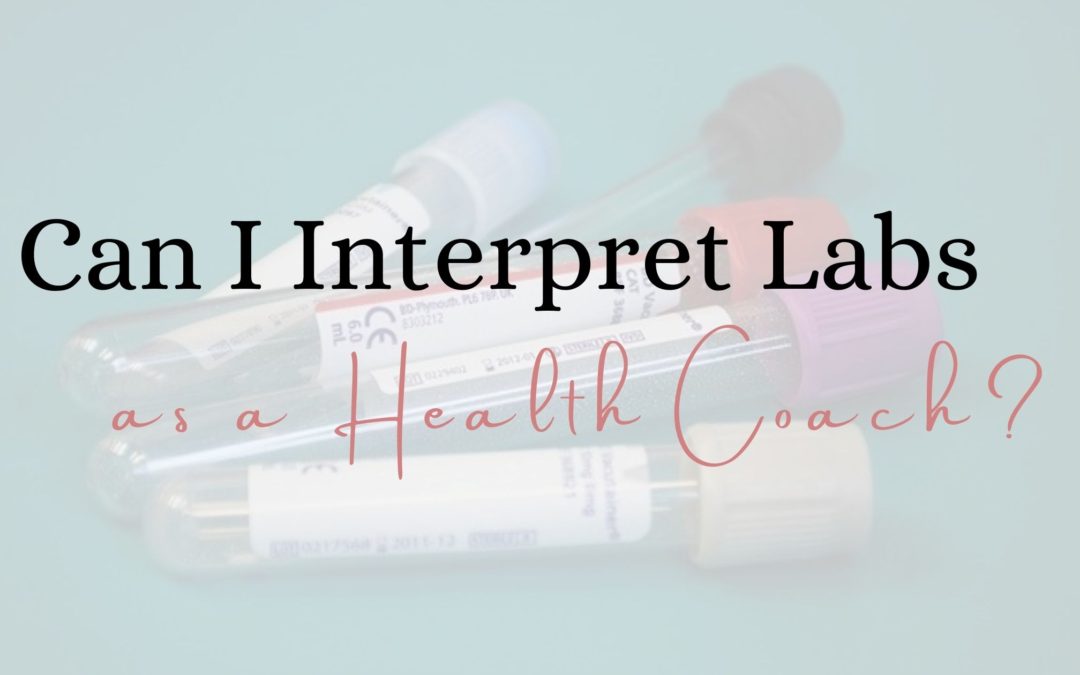With everything going on in the world today, many people are looking to functional medicine, overall health and well-being, and taking a deeper look inside things like hormone health, toxins, and vitamin and mineral levels to optimize health and “bio hack” our way into feeling better and performing at optimal levels.
With this trend comes more and more health and wellness coaches, practitioners, and certified experts with programs designed to perform things like blood tests, hair tests, and other lab work in order to interpret various aspects of wellness, and help others achieve this optimal performance level.
However – not all health and wellness coaches are actually able to read and interpret labs…in fact, most are NOT able to do so, which comes as a huge surprise to many. I get asked almost weekly about the DO’s and DON’TS of running labs as a non medical doctor, and what the ethical issues can be.
In short, here are some of the key factors to keep in mind, before you start offering programs or services that include lab work:
- What does YOUR state say?
The first step in ensuring you are providing ethical, legal information to clients is to review your state’s guidelines on what types of services health and wellness coaches may provide to their clients, without crossing over into territory for which they are not properly licensed or educated.
- What test(s) are you looking to offer to your clients, and what do you plan to do with the results?
When coming up with online courses, programs, or wellness-based offerings, many health and wellness professionals are including lab results or some kind of blood, urine, or health test. However, it may not be legal or ethical for you as the health coach to order, review, or interpret any kind of test like this. Because of this, I highly recommend taking a step back and really looking at the big picture of the program you plan to offer: what is the overall goal you’re working toward with your client? What is the problem you’re solving? Is it absolutely necessary to complete lab work, or is it just an added benefit that you could easily pass off to a medical provider? Asking these kinds of questions will help you in the long run, to avoid spending time and energy on a program that you may not be able to ethically complete.
- Review vs. Interpret
This is a big one. As we talked about above, the first step is always to review your state’s rules regarding what you can and cannot do as a health coach. If your state allows you to provide nutrition education to your clients, you may be able to “review” your clients’ lab results with him/her. BUT – PLEASE know this is NOT the same as Interpreting lab results.
Reviewing lab results is on par with providing your clients education: you’re looking at the lab result and simply reviewing the results with them – teaching them the different names listed, different levels listed, and providing general education on the lab test they took and information about the results.
In many states, the line is crossed when you start INTERPRETING the lab results. While these two words may seem like the same thing, interpreting actually brings a bit more into the game. Interpreting lab results means you are now progressing from just “reviewing” the results with your client (e.g. educating them on what the lab results are telling them, explaining the general levels, names, and meanings), and are now explaining their personal results, telling them what each of their levels means, and providing recommendations for what they should take, eat, or alter, in order to improve their health and wellbeing. Nearly all states will look at this action as providing medical advice, as you are reviewing a medical test, interpreting the results, and likely providing the client with some kind of recommendation or advice for how to proceed based on your interpretation of the results. Unless you are properly licensed to provide medical advice to patients in the state where your client is located, this may raise some red flags, and could get you in hot water for providing medical advice without a license.
- So What CAN I do?
An important thing to remember as a health coach is that you are NOT a doctor, nor licensed medical provider, which means you cannot provide any kind of service that even remotely looks like medical advice. However, when done right, this should in no way affect or impact your abilities to provide services as a health coach. Why? Because health coaching is focused on the behavior of the client — how can you help your client become informed, feel supported, be held accountable for his/her goals and actions, and provide a setting that allows them to succeed? The medical advice piece? The lab interpretation and recommendation or prescription of medications, supplements, or diet/lifestyle change? That’s the easy part. Refer this out to a licensed medical provider in the client’s state to ensure everyone is operating legally and ethically. This way, you are ensuring your client receives personalized medical advice on the lab report, and you’re removing yourself from liability should the client have a negative response or reaction to what was prescribed. Once that’s done, and the client has his/her doctor-approved recommendations, you can begin the long-term work! As many of you likely know, the challenging part is actually supporting your client through those changes – helping them form healthy habits, teaching them healthy lifestyle choices, holding them accountable when they want to exercise or change their diet.
Need legal docs as a health or wellness coach? CLICK HERE for my health coaching bundle!
Grab my FREE Legal Checklist to see if Your Business is Legally Compliant!



Nurse Coach National Board Certification is now 7 years new. Six privately owned nurse coaching programs, and 3 DNP programs offer preparatory programs for National Board Certification Exam. http://www.AHNCC.org